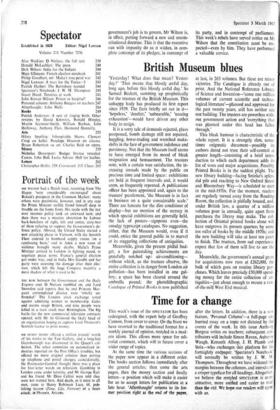Portrait of the week
MR WILSON had a Dutch treat, returning from The Hague 'very considerably encouraged' about Britain's prospects in the Common Market: many others were pessimistic, however, and in any case the Prime Minister swiftly found himself deep in trouble on the home front. His tussle with the 'roc over incomes policy took an awkward turn; and Shen there was a massive abstention by Labour back-benchers of right, left and centre, sixty-two of them refusing to support the Government's de- fence policy. Abroad, the United States started a new attacking phase in Vietnam, with the Seventh Fleet ordered to bombard supply routes 'on a continuing basis,' and in Aden a new wave of violence brought many deaths. Malta's Prime Minister arrived in London in fighting mood, to negotiate peace terms. France's general election got under way, and in India Mrs Gandhi and her party were assessing the damage after their elec- tion, which left the huge Congress majority a mere shadow of what it used to be.
THE ROW between the Government and the Daily Express over D Notices rumbled on, and Lord Snowdon said reports that he and Princess Mar- garet contemplated divorce were 'wholly un- founded.' The London stock exchange voted against admitting women to membership. Gales and storms swept Britain, and nine people were killed in a train crash near Birmingham. The big battle for the new commercial television contracts opened, with Mr Jo Grimond the likely head of an organisation hoping to capture Lord Thomson's Scottish licence to print money.
MR HENRY MOORE offered a million pounds' worth of his works to the Tate Gallery, and a long-lost Gainsborough was discovered in the Queen's col- lection. The select committee on nationalised in- dustries reported on the Post Office's troubles, but offered no more original solution than putting up telephone and postal charges; coincidentally, the Postmaster-General thought there was a place for four-letter words on television. Gambling in London came under scrutiny, and MI George Raft and his friend Mr Dino Cellini were told they were not wanted here. And death, as it must to all men, came to Henry Robinson Luce, 68, pub- lishing tycoon (Time, Life, Fortune) of a heart attack: in Phoenix, Arizona.


































 Previous page
Previous page